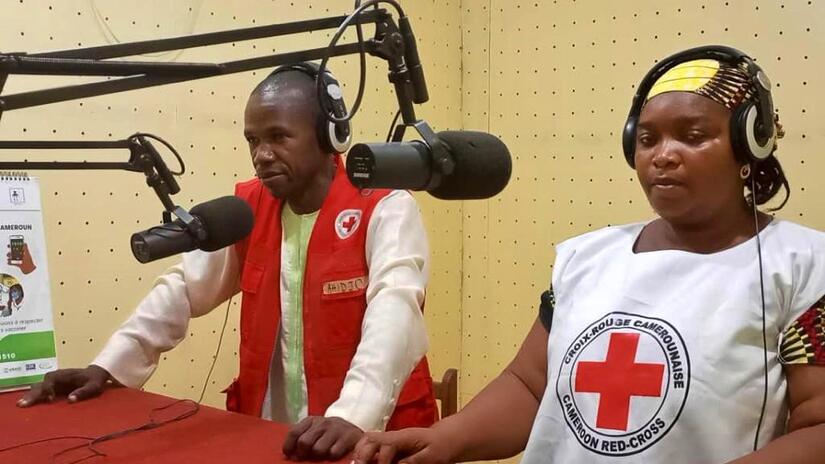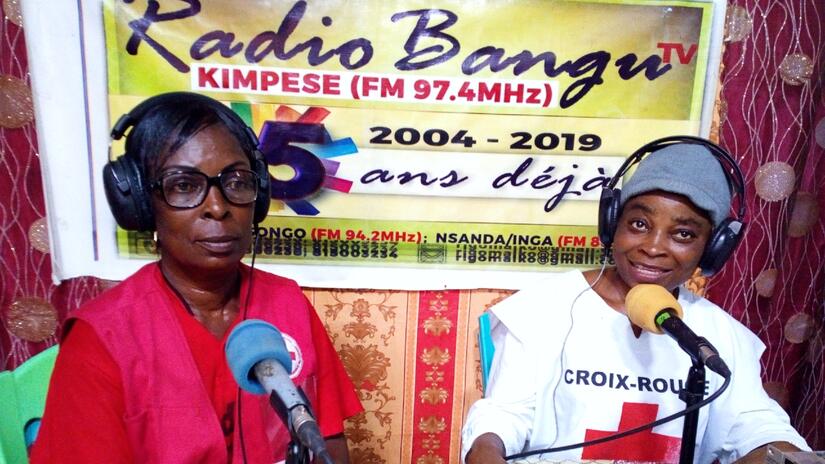Though we’re living in an increasingly digital world, radio remains an important source of information, entertainment, and connection in countries across the globe.
This is especially true among rural communities, for whom radio is often the most trusted—or sometimes only—source of news and information for miles around.
Imagine you’re living in one of these communities, far from the nearest health centre. You notice people are falling sick and you don’t know why. Seeking answers, you tune into your local radio station.
The presenter is talking about the ‘mystery illness’ in a panicked way, saying how gruesome the symptoms are, how many people have died, and how you should avoid infected people at all costs. He’s heard the illness could be some kind of curse, and that apparently drinking salty water can protect you.
Hearing this report, and with no other sources to turn to, you’d probably feel scared and unsure of what to do.
But imagine you tuned in and heard a totally different show. The presenter calmly offers practical information about the disease—its name, symptoms, how it spreads, and measures you can take to protect yourself. He interviews a local doctor you know and trust who responds to common questions and concerns.
You’d feel reassured and have the information you need to keep you and your family safe.
In several countries, the IFRC and our National Societies are partnering with local media to do exactly this: provide life-saving information before, during, and after health outbreaks.
As part of the Community Epidemic and Pandemic Preparedness Programme (CP3), we’ve been working with the charity BBC Media Action to train journalists and Red Cross Societies from seven countries in Lifeline Programming: special media programming that provides accurate, practical, and timely information in a health or humanitarian crisis.
National Societies regularly partner with media outlets to broadcast helpful information that keeps communities healthy and safe from a wide range of diseases. Let’s look at some examples.
Kenya
In Bomet and Tharaka Nithi counties, Kenya Red Cross teams up with local radio stations and county health services, reaching hundreds of thousands of people with useful health messages on how to prevent diseases such as anthrax, rabies and cholera.
Information is shared in simple language. And listeners can call in to ask questions or suggest health topics for discussion.
“At first, media was known for reporting two things, maybe: politics, and bad things that have happened in society. But the Red Cross helped us […] use the media in educating the people about disease,” explains Sylvester Rono, a journalist with Kass FM trained in Lifeline programming.
“I am now proud to say that this has really helped our communities. Our people are now appreciating why we should vaccinate our pets, why we should go to the hospital when we have a bite, why we should report any [health] incident, and when you see any sign of diseases, be it rabies, be it anthrax, be it cholera […] the importance of reporting it earlier,” he adds.
Cameroon
In late 2021, a cholera outbreak threatened the lives of communities in the North region of Cameroon—a rural part of the country where communities are widely dispersed.
As part of its response, the Cameroon Red Cross teamed up with local radio stations—launching a series of community radio programmes to share information on how people could protect themselves, what symptoms to look out for, and where to access help if they fell sick.

Cameroon Red Cross staff in the North region are interviewed as part of a radio show to help communities stay safe from cholera and other diseases.
Photo: Cameroon Red Cross
Themes for the programmes were selected in partnership with community leaders. And after the shows broadcast, Red Cross volunteers headed out into their communities to reinforce the messages shared on air through door-to-door visits.
“The radio programme is very good, because it has given me practical information. I had a cholera case in my family, but based on the measures I heard on the radio, I was able to save my sister’s child who was sick,” explained Talaga Joseph, a listener who called into FM Bénoué—one of the participating radio stations.
Democratic Republic of the Congo (DRC)
In DRC, harmful rumours and misinformation about COVID-19 and other diseases have spread across the country in recent years. For example, some people believed the COVID-19 vaccine was a source of income for the government and had no benefit to society, while others believed the measles vaccine was less effective than traditional remedies involving cassava leaves.
To address these rumours, DRC Red Cross volunteers went door-to-door to collect community feedback and record common myths and misconceptions. After analysing the feedback, DRC Red Cross staff took to the airwaves—launching interactive radio shows to directly address and debunk health misinformation and provide trusted advice.
For example, in Kongo Central province, the DRC Red Cross partners with Radio Bangu to produce a show called ‘Red Cross School’. Listeners call in to check information on different diseases, ask questions, and discover what support they can access from the Red Cross.
“The collaboration with the Red Cross is very good and has enabled listeners to learn more about its activities and how they can prevent different illnesses and epidemics. The Red Cross broadcasts are so popular they have increased our overall number of listeners in the area we cover,” says Rigobert Malalako, Station Manager at Radio Bangu.

Red Cross of the Democratic Republic of the Congo staff take to the airwaves on Radio Bangu in Kongo Central province to share accurate health information, combat disease myths, and explain what services the Red Cross provides in local communities.
Photo: DRC Red Cross
--
The activities with local radio featured in this article are just a few examples of media partnerships developed through the Community Epidemic and Pandemic Preparedness Programme (CP3).
Funded by the U.S. Agency for International Development (USAID), CP3 supports communities, Red Cross and Red Crescent Societies, and other partners to prevent, detect and respond to disease threats.
If you enjoyed this story and would like to learn more, sign up to the IFRC’s Epidemic and Pandemic Preparedness Newsletter.
You can also access the following resources:
- BBC Media Action’s Guide for the media on communicating in public health emergencies (available in multiple languages)
- BBC Media Action’s Lifeline programming website
- IFRC Epidemic Control Toolkit

